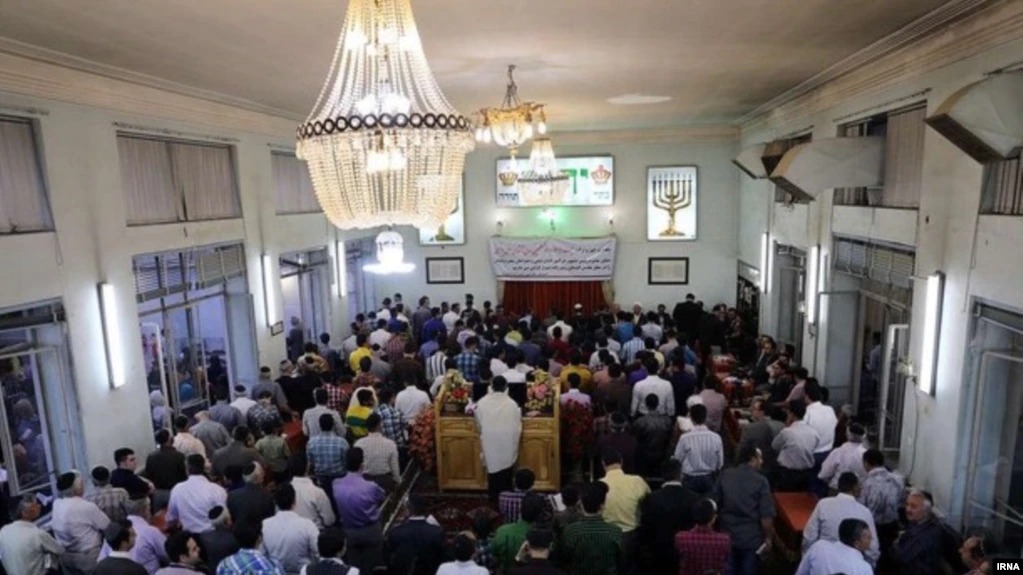Members of Iran’s Jewish community are trying to project a sense of calm from their shuttered homes in Shiraz and Tehran, but fear lurks under the surface, Ynet reported.
The report quoted Zahava, an Israeli from Iran who received what may be the last WhatsApp message from a childhood friend in Shiraz.
“In Persian, she wrote that the police had taken the chazanim and Rabbanim in for questioning. They were suspected of collaborating with Israel. To this day, we don’t know if they’ve been released,” Zahava said from her home in Haifa,
“She told us it’s best not to contact the Jews there right now—the situation is extremely fragile. We used to be in touch daily. There’s a very active WhatsApp group that keeps everyone updated, but since the war started, there’s been complete silence.”
“The Jews are staying inside, too afraid to go out for fear it could cost them their lives. They’ve disconnected from the internet so that no messages or information can leak out. During times like these, we’re careful not to reach out, to avoid giving the regime any excuse to harm them,” Zahava explained.
Lydia left her parents’ home in Tehran almost 30 years ago. Speaking to Ynet from her home in Holon, she revealed details of an unusual phone call she had last week with her brother and his wife.
Her brother, a resident of northern Tehran, told her they were warned that Jews with ties to Israel would be arrested and sent to prison. His wife added, “We had nowhere to go, so we went to an aunt’s house in the western part of the city. It’s safer there. It’s a big house where all the children and grandchildren are staying together.”
Her brother also told her that from his balcony, he saw Israeli planes bombing targets nearby. “We waved to the pilots and loved seeing the Israeli army in action,” he said. “Redemption has arrived. We thank the Creator. Now that Israel has come to help us, there will finally be peace in Iran.”
Lydia added that even before the October 7 massacre, some of her relatives tried to flee to America, about five years ago. She said that they sold their belongings and packed one suitcase each, “as if they were going on vacation.”
But then, everything fell apart: “Four members of the family were killed,” Lydia said. “When I spoke to them, they sounded fine. Family members who visited said they just had a mild flu—and the next day they were gone.”
“Now everyone there is living in fear, not understanding how all of this suddenly fell upon them. The Iran-Iraq War was 40 years ago—most of them don’t even know what air raid sirens sound like. They’re living under existential chaos. And yet, all of that doesn’t scare them as much as the regime itself does. I’m talking about the leadership that, over the years, slaughtered, murdered, raped, cut women’s lips for wearing lipstick, issued massive fines for nothing, and turned people’s lives into hell.”
Noga, a New Yorker who left Shiraz after the 1979 Islamic Revolution, said that there are still about 7,000 Jews in the city.
“When there’s a conflict in Israel, the government forces the Jews to publicly declare that they’re against Zionism,” she explains. “It’s the regime’s way of separating Judaism from Zionism—showing that the Jews are loyal to Iran. And when Iranian leaders issue threats against ‘collaborators with the Zionists,’ the fear can be paralyzing.”
Noga told Ynet that these days, every phone call is risky. “If you call from Israel, they know. They just know.”
“On the first day of the war. It was a call like all the ones before—‘Hello, how are you?’ They answered, ‘We’re fine.’ We replied, ‘Okay, goodbye,’ and hung up. The next day, my cousin spoke briefly with his parents in Shiraz. They said they’d been hearing explosions but didn’t say much more.
“Because of my ties to Israel, I personally avoid calling them. Most of the contact is through cousins who’ve never been to Israel. We’re certain that Iran’s intelligence services keep a kind of ‘blacklist’—they know exactly which Jews have ties to people connected to Israel, and who doesn’t.”
Noga clarified that even before the war, her conversations with relatives in Iran were very stilted. “The communication is very short, concise and far from revealing what’s actually going on. We talk about fashion, about family weddings—anything that avoids the real issues. And when we do touch on them, the language is always coded.”
“The questions come from the world of weather—it’s how we understand if things are good or bad: Is it stormy or cold? Hot or is a storm coming? And the answer might be something like, ‘Right now things are okay, but we heard tomorrow there’ll be a flood,’ or, ‘An earthquake is expected.’ That’s how I gather information about how they’re really doing in sensitive times.”
“For instance, when the ayatollah spoke about ‘Zionist spies’ and made statements like, ‘We will catch the traitors, deal with their families and not let them continue to live,’” Noga says.
“Still, in normal times—so long as Jews don’t stand out, keep a low profile and live quietly—life there is actually quite good. Business is good, the food is great, families are together and they enjoy a fair amount of freedom. But if you do anything that draws attention, even the wealthy, influential Jews are not protected from the regime.”
“The regime will stop at nothing to instill deep fear in the community,” she says. “They’ll make an example of anyone they suspect of collaborating with Israel. If it’s true that Rabbanim and chazzanim were detained, it’s a very troubling situation, and urgent action is needed to secure their release.”
“Sometimes my husband and I watch the news from Iran and we just cry. You see the heavy presence of the Sapo—the special police that hunt down citizens who speak out against the ayatollah. You see the bombings, the collapsed buildings, and the destruction in the streets. The death toll and number of wounded rises daily—and we can’t even get updates about the condition of our loved ones over there.
“Shiraz will always be my city, but Iran is no longer my country,” says Noga. “Before the revolution, they used to call it ‘the Paris of the Middle East.’ Now, despite all their advanced missiles, the mullah regime has dragged it back a hundred years. That’s why we hope this is their end. Let them go to hell so that everyone can finally breathe. In the meantime, we’re all keeping a low profile and waiting.”
Noga emphasizes, “People need to understand: Persians are not a stupid people. The ones pulling the strings—the government officials, the heads of the media—they’re educated, with degrees from top universities in the U.S. and Europe. They speak multiple languages.
“In the past, Persian immigrants who came to Israel for a better life often arrived with nothing—no money, no education. Today, I look around and see engineers, doctors and influential figures in key positions, many of them of Persian descent—mostly Jews, but not only. Outside of Iran, they’ve found the opportunities that were denied to them back home.
“Even today, it’s extremely difficult for Jews in Iran to get into university. Priority goes first to the children of mullahs—especially those who lost someone in war. Then to Muslims. Only at the very end, maybe, a Jew—and only if he’s a real genius. To this day, Jews can’t work for most companies—especially government ones, but even many private firms—unless they have a Muslim partner. That’s the reality. So no matter what Jews are forced to show outwardly, from what I know of them, they all agree: these mullahs need to go to hell so Iran can return to the days of the Shah, to the beloved country it once was.”
(YWN Israel Desk—Jerusalem)












2 Responses
Why would any rational &_or sane Jew[ess] still be residing in Iran 🇮🇷 🤔
“We waved to the pilots and loved seeing the Israeli army in action” – remove this story immediately. Incredibly reckless to post this.